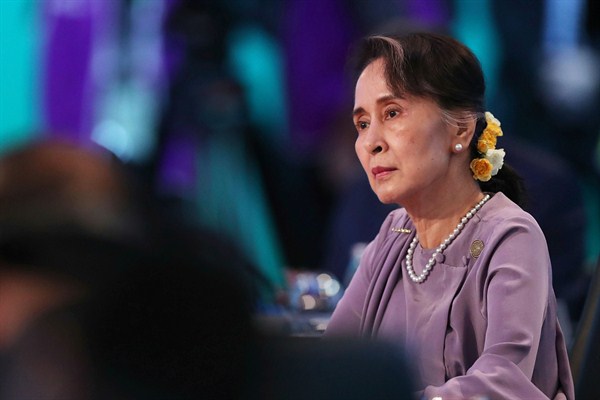One of the enduring mysteries in recent years is what happened to Myanmar’s Aung San Suu Kyi. Somehow, some way, the woman known as “the Lady of Burma”—who won the Nobel Peace Prize in 1991 after she spent 15 years under house arrest in Myanmar for her democratic activism—seems to have lost her soul. Her drive to the top of Myanmar’s political hierarchy and quest to burnish her political legacy have been relentless, but also devastating for all those who once hailed her commitment to democracy and nonviolence.
Since she became the de facto civilian head of Myanmar’s government following landmark elections in 2015, assuming the newly created position of state counselor, equivalent to prime minister, Aung San Suu Kyi has emerged as one of the most virulent defenders of the military junta that separated her from her family for years and ruled Myanmar for decades—and whose generals still wield most of the power in the country. This week, however, the Nobel laureate showed just how much she will compromise for the sake of power when she announced that she will personally lead the legal team defending Myanmar against charges of genocide at the International Court of Justice. Next month, she will travel to The Hague to fight tooth and nail in a case brought to the ICJ recently by Gambia, with the support of the Organization of Islamic Cooperation, alleging that Myanmar’s military committed crimes against humanity and ethnic cleansing in its campaign to drive minority Rohingya Muslims out of western Myanmar.
The announcement comes at an inauspicious time for Myanmar, since this is not the only case seeking justice for the hundreds of thousands of Rohingya who have been displaced from their homes since the military onslaught began in August 2017. As noted by Andrew Boyle at Just Security, in addition to the war crimes charges at the ICJ, government officials in the majority-Buddhist country are also facing additional charges of genocide and crimes against humanity brought on behalf of the Rohingya under a universal jurisdiction claim in Argentina. Meanwhile, judges at the International Criminal Court in The Hague have also authorized the court’s chief prosecutor, Fatou Bensouda, to move forward with a formal investigation into charges that Myanmar’s leaders, including Aung San Suu Kyi and her military compatriots, were complicit in genocide.

